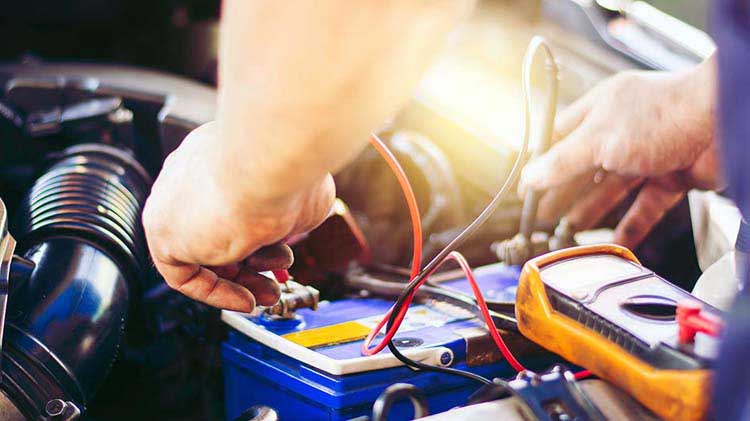China Integration of Smart Grids with Lithium Batteries: Revolutionizing Energy Management
Introducere:
As the global energy demand continues to rise, it has become imperative to explore innovative solutions to meet this growing need sustainably. The integration of smart grids with lithium batteries presents a promising avenue for revolutionizing energy management. This article delves into the potential benefits, challenges, and future prospects of this integration.
1. Benefits of integrating smart grids with lithium batteries:
1.1. Energy storage: Lithium batteries, with their high energy density and long cycle life, offer an efficient solution for storing excess energy generated by renewable sources. This stored energy can be utilized during peak demand periods, enhancing grid stability and reducing reliance on non-renewable energy sources.
1.2. Grid balancing: The fluctuating nature of renewable energy sources poses challenges for grid operators. By integrating lithium batteries into smart grids, surplus energy can be stored during low demand periods and discharged during high demand periods, enabling efficient grid balancing and reducing the need for traditional power plants.
1.3. Demand response: Smart grids equipped with lithium batteries facilitate demand response programs, allowing consumers to adjust their energy consumption based on real-time price signals. This empowers users to make informed decisions, optimize their energy usage, and contribute to a more sustainable energy system.
1.4. Enhanced efficiency: Smart grids integrated with lithium batteries enable efficient two-way communication between consumers and utilities. By providing real-time data on energy consumption, these grids facilitate better load management, voltage control, and fault detection, leading to energy savings and improved system reliability.
2. Challenges to overcome:
2.1. Cost: Despite the declining costs of lithium batteries, their initial investment remains relatively high. Widespread adoption of this integration will require further advancements in battery technology and cost reduction to ensure economic viability for both utilities and consumers.
2.2. Infrastructure: Integrating lithium batteries into existing grid infrastructure necessitates upgrades and modifications to accommodate the unique requirements of energy storage systems. This may involve considerable investments in grid infrastructure, necessitating clear strategies and funding mechanisms.
2.3. Safety and sustainability: Proper handling, disposal, and recycling of lithium batteries are critical to ensure safety and minimize their environmental impact. A comprehensive framework addressing these aspects must be developed to mitigate potential risks and promote sustainable use of lithium batteries.

3. Future prospects and developments:
3.1. Advancements in battery technology: Ongoing research and development efforts are focused on enhancing the performance and durability of lithium batteries. Innovations such as solid-state batteries and battery management systems are expected to further improve energy storage capabilities, efficiency, and safety.
3.2. Integration with renewable sources: The integration of lithium batteries with renewable energy sources like solar and wind power can address the intermittent nature of these sources. This integration can enable reliable and consistent power supply, thereby accelerating the transition to a clean and sustainable energy future.
3.3. Grid-edge solutions: The emergence of distributed energy resources and the Internet of Things (IoT) is paving the way for grid-edge solutions. By integrating lithium batteries at the consumer level, decentralized energy systems can be developed, promoting energy independence and local resilience.
Concluzie:
The integration of smart grids with lithium batteries has the potential to revolutionize energy management by enhancing energy storage, grid balancing, demand response, and overall system efficiency. Despite challenges related to cost, infrastructure, and safety, ongoing advancements in battery technology and renewable energy integration provide a positive outlook for the future. The development of clear strategies and policies, along with continued research and development, will be crucial in unlocking the full potential of this integration and achieving a sustainable energy future.
-
 As technology continues to advance, the choices for motorcycle batteries are becoming more varied and sophisticated. One of the latest and greatest options for powering your bike is the LiFePO4 motorcycle battery. This type of battery offers a number of benefits over traditional lead-acid batteries, making it a popular choice for riders who demand the best performance possible. Here are...Citeşte mai mult
As technology continues to advance, the choices for motorcycle batteries are becoming more varied and sophisticated. One of the latest and greatest options for powering your bike is the LiFePO4 motorcycle battery. This type of battery offers a number of benefits over traditional lead-acid batteries, making it a popular choice for riders who demand the best performance possible. Here are...Citeşte mai mult -
 Introduction: The demand for high-performance batteries has been on the rise in recent years, driven by the increasing adoption of electric vehicles, energy storage systems, and other portable devices. The lithium iron phosphate (LiFePO4) battery chemistry has gained significant attention due to its superior safety, long cycle life, and high energy density. To ensure optimum performance and extended battery life,...Citeşte mai mult
Introduction: The demand for high-performance batteries has been on the rise in recent years, driven by the increasing adoption of electric vehicles, energy storage systems, and other portable devices. The lithium iron phosphate (LiFePO4) battery chemistry has gained significant attention due to its superior safety, long cycle life, and high energy density. To ensure optimum performance and extended battery life,...Citeşte mai mult -
 As the world is moving towards sustainable and renewable sources of energy, the demand for high-efficiency batteries has increased significantly. In recent years, lithium iron phosphate (LiFePO4) batteries have gained immense popularity due to their long cycle life, high energy density, and low self-discharge rate. However, to make the most of these batteries, it is essential to have an efficient...Citeşte mai mult
As the world is moving towards sustainable and renewable sources of energy, the demand for high-efficiency batteries has increased significantly. In recent years, lithium iron phosphate (LiFePO4) batteries have gained immense popularity due to their long cycle life, high energy density, and low self-discharge rate. However, to make the most of these batteries, it is essential to have an efficient...Citeşte mai mult -
 The 12V LiFePO4 battery is a high-performance power solution that is designed to meet the power needs of various devices and appliances. It is known for its durability, efficiency, and reliability, making it a popular choice for many applications. One of the main advantages of the 12V LiFePO4 battery is its long lifespan. It can last up to 10...Citeşte mai mult
The 12V LiFePO4 battery is a high-performance power solution that is designed to meet the power needs of various devices and appliances. It is known for its durability, efficiency, and reliability, making it a popular choice for many applications. One of the main advantages of the 12V LiFePO4 battery is its long lifespan. It can last up to 10...Citeşte mai mult -
 Bateriile litiu-ion au revoluționat modul în care ne alimentam dispozitivele. De la smartphone-uri și laptopuri până la vehicule electrice și sisteme de stocare a energiei regenerabile, bateriile cu litiu-ion au devenit o parte esențială a vieții noastre moderne. În ultimii ani, au existat progrese semnificative în tehnologia bateriilor cu litiu-ion, ceea ce a condus la îmbunătățiri ale densității energiei, siguranței și longevității. Unul dintre progresele majore...Citeşte mai mult
Bateriile litiu-ion au revoluționat modul în care ne alimentam dispozitivele. De la smartphone-uri și laptopuri până la vehicule electrice și sisteme de stocare a energiei regenerabile, bateriile cu litiu-ion au devenit o parte esențială a vieții noastre moderne. În ultimii ani, au existat progrese semnificative în tehnologia bateriilor cu litiu-ion, ceea ce a condus la îmbunătățiri ale densității energiei, siguranței și longevității. Unul dintre progresele majore...Citeşte mai mult -
 When it comes to boating, having a reliable power source is crucial for a smooth and enjoyable experience on the water. One of the most important components of a boat's electrical system is the marine battery, responsible for powering various onboard devices and systems. Investing in a high-quality marine battery is essential for any boat owner, as it provides the...Citeşte mai mult
When it comes to boating, having a reliable power source is crucial for a smooth and enjoyable experience on the water. One of the most important components of a boat's electrical system is the marine battery, responsible for powering various onboard devices and systems. Investing in a high-quality marine battery is essential for any boat owner, as it provides the...Citeşte mai mult -
 A portable car jump starter battery charger booster starter is an essential tool for any car owner. It is a device that can be used to jump-start a car battery that has died or is weak. It is a compact and portable device that can easily fit in the trunk of your car, making it easily accessible whenever you need...Citeşte mai mult
A portable car jump starter battery charger booster starter is an essential tool for any car owner. It is a device that can be used to jump-start a car battery that has died or is weak. It is a compact and portable device that can easily fit in the trunk of your car, making it easily accessible whenever you need...Citeşte mai mult

